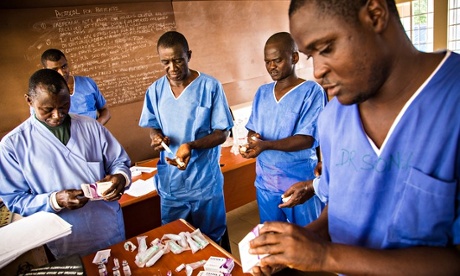Aspen Medical says it has been already approached by 350 volunteers but only 25 to 50 Australians would go at a time

The private company contracted to run an Ebola treatment centre in Sierra Leone expects the workforce to include about 25 to 50 Australians at any one time.
The Abbott government, under pressure to provide practical assistance to containing the Ebola virus in west Africa, pledged funding of $20m to enable the Australian firm Aspen Medical to operate a 100-bed health centre in one of the worst-affected countries.
Up to 240 people will be required to run the centre and Aspen Medical said it expected some 10% to 20% of the team to come from Australia.
The company’s co-founder, Glenn Keys, said the Australian involvement should not be underestimated because workers would rotate in and out of the centre.
“We will be rotating several crews through, there could be quite large numbers of Australians rotate through over the period of the deployment which is still to be defined but it will be in the region of six to eight months,” he said.
Keys said, as of Thursday morning, 350 Australians had used the company’s website to register their interest, describing this as “a fantastic effort and a real commitment on behalf of Australians to help in this crisis”.
He said the company was looking for the right mix of health professionals, doctors, nurses, environmental health workers and logistics providers. The company would also look to recruit staff from Sierra Leone and other parts of north-west Africa, which would assist in building the capacity of the local health workforce, Keys said.
The health minister, Peter Dutton, said Aspen would be on the ground in Sierra Leone “within a couple of days” to start planning, and the staff could arrive in three to four weeks.
Dutton said the company already had a presence in west Africa and would “have this up and running efficiently, effectively, saving lives”.
The Australian government had previously resisted calls to send medical experts to west Africa, arguing it needed guarantees that workers who contracted Ebola could gain medical care and evacuation.
Dutton said a deal reached with Britain ensured that such health workers could receive treatment in Sierra Leone and evacuation to Britain or to a European nation if necessary.
He dismissed suggestions the government could have acted on earlier promises to help.
The European Union’s Foreign Affairs Council, in a statement issued on 20 October, said it was “providing a guarantee that international health workers who volunteer will be provided with appropriate care, locally or through Medevac, within available resources, should they become infected”.
Asked why Australia had not taken up that EU guarantee, Dutton said the government had “acted on the best advice available” and provided “a response of which all Australians can be very proud”.
“Well, we’ve taken a guarantee from the British and we’ve obviously been very pleased with the response from some European countries,” he said.
“We have arrangements in place now, guarantees if you like, that weren’t there before that mean that we can provide security for our health workers. It would have been completely irresponsible to take up Labor’s call weeks ago, before the guarantees were in place, to send healthcare workers.”
The Australian Nursing and Midwifery Federation’s secretary, Lee Thomas, said the failure to act on the earlier EU guarantee was “a bit disappointing”.
“We have had nurses ready to go now for several weeks,” she told the ABC. “Frankly, we have been calling on the government for more than eight weeks now to do more in the fight of Ebola. It is our best defence in Australia, to treat Ebola on the ground in west Africa.
“The past is the past. The government have had a change of heart. We should be positive about this. It is a great first step but yes, we can do more.”
The Greens senator Richard Di Natale, who is seeking consular assistance to conduct a field trip to west Africa, said Australia’s “shameful” delays in acting had “cost people their life”.
Di Natale said government officials had failed to volunteer information about the 20 October EU guarantee at a Senate estimates hearing several days later.
“It’s all very well and good [for the prime minister] to run around talking about shirt-fronting Russian presidents or talking tough on terrorism, talking about evil death cults, but this [Ebola] is as much a security and economic threat as it is a health and humanitarian catastrophe,” he said.
The opposition leader, Bill Shorten, told the ABC the government had “sat on its hands” despite repeated calls from medical experts about the need to contain Ebola at its source rather than waiting for it to spread.
He said volunteers wanted to help in west Africa but the government needed to put more steps in place to make it easier for them to provide assistance.
Tony Abbott played down the potential for Ebola to be discussed at the G20 summit in Brisbane next week, saying the outbreak was a public health emergency but “not a security emergency” and “certainly not an economic emergency”.
“I don’t think at this stage we want to overestimate the impact of Ebola on the global economy,” the prime minister said.
“It’s not entirely negligible, but nevertheless none of the three seriously affected countries are major economies. They’re not major trading nations; they’re not countries of large GDP.”
Dutton said Abbott’s comments about the gross domestic product of affected countries were “a statement of the obvious”.
But the United Nations secretary general, Ban Ki-moon, said in September the Ebola crisis had “evolved into a complex emergency, with significant political, social, economic, humanitarian and security dimensions”.
A UN security council resolution adopted in September with Australia’s support described the “unprecedented” extent of the outbreak as “a threat to international peace and security”.
